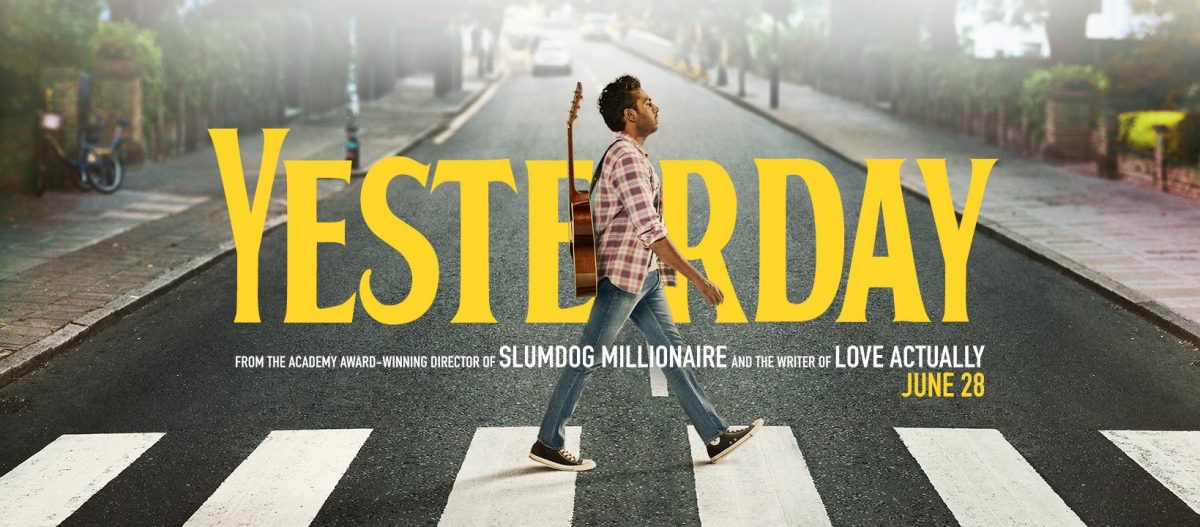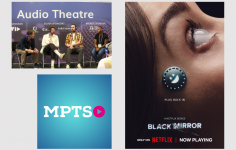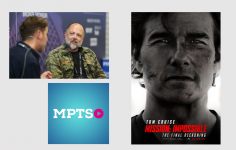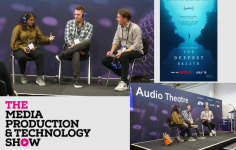Come Together
Those of you who keep tabs on feature film projects in-the-works will know the feeling: When something intriguing is taking shape.
For much of late 2018, IMDb and others were talking of an ‘Untitled Danny Boyle / Richard Curtis feature project’ in the pipeline. Those two names run together easily enough, especially if you don’t think too much about it. Both are revered figures in the British film industry, after all.
But together? Other than award ceremonies, Danny Boyle and Richard Curtis don’t inhabit the same world. Would we be seeing 28 Days and a Funeral Later? Leith Actually?
Then, at the beginning of this year, names started being attached to the project. We also got a release date of June 28th (Today, at the time of writing). Then the trailer dropped.
Looks like fun, right?
One thing that unites Danny Boyle and Richard Curtis movies is their choice of Supervising Sound Editor: Glenn Freemantle. Glenn’s work with Boyle on Slumdog Millionaire won him an Oscar nomination in the Best Sound Editing category: An award he went on to win, for Gravity, in 2014.
Resurface spoke to Glenn at the recent Media Production Show in London about Yesterday, his work with the director and writer, and much more besides:
We Can Work It Out
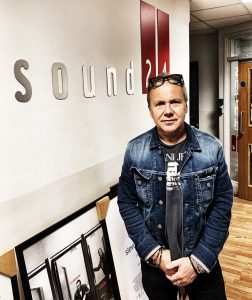
Resurface: Watching the Yesterday trailer, and based purely on the premise – it’ll certainly be feel-good, but like any feel-good movie it runs the risk of being sentimental, I guess that’s the Danny Boyle factor, making sure that doesn’t happen?
Glenn Freemantle: Definitely, there’s the two sides to it. I’ve worked with Richard a lot, and with Danny a lot.
R: Which seems to be the thing they have in common, that pretty much every Richard Curtis movie, and every Danny Boyle movie, is you.
GF: They’re both titans of the industry. I’ve worked with Richard as a Director and a Writer, and with Danny as a Director and as a Producer. They have so much respect for each other. When Danny read the script, he realised there was an opportunity to approach it a different way. It worked brilliantly between the two of them. Richard’s great dialogue is very important, then there’s the Danny Boyle style which is edgy, very cool and dynamic. You almost have to break the film first to be able to fix it. It was quite a process, having to look at it a different way to try and bring the two styles together. I think it worked really well in the end.
R: In your role as collaborator, Supervising Sound Editor, there’s a unique aspect: in terms of when you get involved
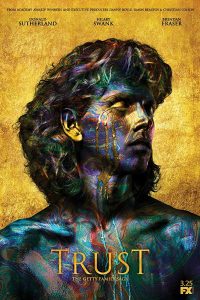 GF: I got involved in this film without knowing the title of it, about a year before we started making it. We were talking about it when we were making Trust. Danny will have his Heads of Department, who he knows can handle their side of it – without any fuss – He’s an expert in what he does, so he gives me and his other heads of department a massive scope, because he wants you to bring something to it.
GF: I got involved in this film without knowing the title of it, about a year before we started making it. We were talking about it when we were making Trust. Danny will have his Heads of Department, who he knows can handle their side of it – without any fuss – He’s an expert in what he does, so he gives me and his other heads of department a massive scope, because he wants you to bring something to it.
You get a lot of trust and responsibility, Danny’s not on your back or telling you what to do. So you get the best out of everybody, but you have to make sure your crew is right.
Sound is massively important to him, and that’s also true of some other directors, Kevin Garland, Alfonso Cuaron, Kevin Macdonald. There’s a point in this film, and it comes at the end, where sound is actually the only thing anyone’s worried about.
The Long and Winding Road
R: You’re there at the moment of conception of the idea, defining the shape of it and, uniquely, you’re still there at the very end.
GF: Sometimes a year, or two years, earlier than everyone else, and then you’re the last person standing. Sometimes that’s my favourite part, like on Friday when I had the Odeon Cinema Leicester Square all to myself ahead of our cast and crew screening and the premiere. You sit there, and it’s done, with 400 speakers and Dolby vision, and it’s awesome.
R: We’re in an era of films where music is a central character. Looking at the last two or three years there’s LaLaLand, Greatest Showman, Bohemian Rhapsody, and most recently Rocketman: Do films where the music plays that prominent a part, present any particular challenges?
GF: At the end of the day you’re still telling a story. In this case the lyrics are telling a story. It’s certainly a very difficult task for the composer.
Writing original music to sit in amongst Beatles tracks! It could almost be professional suicide, but Daniel Pemberton did some really clever work in between.
Having a different take on it but linking it in. If you watch it you’ll pick it up. Doing the music on a Danny Boyle film is a lot of work for anybody. I think he did an excellent job.
As a Supervising Sound Editor you always want to get to know the composer, because you’re both trying to tell a story, and with sound design it’s not just about throwing sound at a film. I learned that as a young buck.
The sound isn’t about the sound, it’s about the story. When you learn that, when you grasp that concept, then you become a lot better at your job.
You become less about you and your team, and all about the whole film. The quicker you can get to that point, the quicker you can become successful.
Producers and directors will see that in you as well, that you’re not scared to dump this, or try that. You want the film to tell a story and the sound should be there for a reason, not just ‘cos its there. When you first start, you think you should put everything everywhere. But that’s like putting chicken, fish and pudding on your plate. They’re great, but they’re not great together.
Revolution
R: You mentioned Trust earlier, and I’m also thinking now of your work on Bird Box, which was a huge Netflix phenomenon at the turn of this year – There’s a lot of talk about how we see directorial and acting talent ‘crossing over’ from film to TV and I guess you’ve done the same thing recently, as those lines have become blurred?
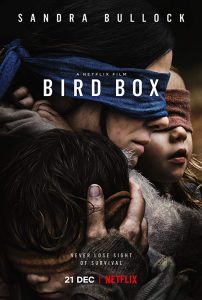 GF: They absolutely are, I work with directors who are making TV shows, Alex Garland is doing Devs at the minute. They’re creating that quality on the small screen. So with Sandra Bullock in Bird Box – and I also did Angelina Jolie’s First They Killed My Father – they were made like films. There was no difference, from my point of view. That’s where it’s changing, the scripts are great, the actors are great, they look amazing with the same cinematographers working on them, and so it’s back to the story. There’s certainly the ambition and that competition pushes everybody. Now you can do anything you want if you’re daring enough.
GF: They absolutely are, I work with directors who are making TV shows, Alex Garland is doing Devs at the minute. They’re creating that quality on the small screen. So with Sandra Bullock in Bird Box – and I also did Angelina Jolie’s First They Killed My Father – they were made like films. There was no difference, from my point of view. That’s where it’s changing, the scripts are great, the actors are great, they look amazing with the same cinematographers working on them, and so it’s back to the story. There’s certainly the ambition and that competition pushes everybody. Now you can do anything you want if you’re daring enough.
R: Thats the big change we’ve seen, the blurring of the lines between what was – in inverted commas – Television, and film
GF: More and more, with Netflix, Amazon and Apple. I had some heads of post over at Pinewood to meet me a couple of weeks ago. What they want to bring to this country is huge. They’re not fleeting either, they’re here to stay. They want to make something special, which is great. I’m very biased, but sound in anything has a massive impact.
You talk to Danny Boyle and he’ll say sound is 75% of his movie, Alex Garland will say the same. It’s coming to the fore more than it was before I think.
R: I once read a quote from Danny Boyle, from back when he was making Shallow Grave in the early part of his career, where he was wondering what it was that made American movies different to what was coming out of Britain at the time. He came to the conclusion that it was the sound. You know this of course, you may have even been in the room when he said it, but I read it subsequently!
GF: No, I know, I was with him the other day when he said it again. He told the story of when he said that, he was with Kevin Macdonald at the time. They were talking about the scale of the sound and the money that was spent on it. Kevin said it’s about ring-fencing. Giving enough money, enough time and enough scope to do it properly. And it is about having the resources.
The biggest resource you can really have is time. You can have the most technology in the world, but enough time – at the right time – is the important thing.
We touched on this on Sunday in an interview we did for a magazine. One of the things we had with Yesterday was that we had to stop and wait – for some reshoots and a couple of music clearance things – so we had some time away from it and then came back to it, and that was amazing.
Normally, when you’re on a film, what happens is you’re watching it and watching it and you’re mixing it, trying to make decisions so you can finish at a certain point. We’d been away for a few weeks then had a screening in Tribeca Film Festival. Sitting back and watching it as an audience member, with that perspective, is amazing because you think about other things. The arc of it, not just individual sounds, about how it takes you on a journey. That’s how you get the emotion out of it – and that’s time.
Film making isn’t a science. You can put a film together and it doesn’t work so you have to look again. The best minds in the world go through the same process.
Then it works and you’re a genius. We weren’t all geniuses when it wasn’t any good at the beginning.
R: You mentioned some clearance issues. Presumably with Yesterday, getting that done was a big part of making it happen.
GF: We did all that at the beginning of course, but then there was something really good that Danny wanted to happen, that he was passionate about and that made a difference to the film at an emotional level. I won’t say what it is but it happens at the end – and that’s what great directors do, they dig their heels in and they do it for the right reasons, Because they feel it’s something worth fighting for.
Here, There and Everywhere
Audience question: In terms of effects in a film, what percentage would you say comes from library and from getting your own tailored effects, and what are the strengths and weaknesses of each?
GF: We’ve got masses of library, but we do try to record everything we can. In Yesterday there’s a big sequence at Wembley in front of 80,000 people. There’s a story aspect to that crowd sound which, back in the summer, was one of Danny’s biggest worries. It’s not something you can get, to orchestrate 80,000 people to make the sound you want.
To try and get that sequence to work, we had a meeting in Pinewood. Outside a stage, in the sun, with a sandwich, about needing the emotional content of that crowd, which we hadn’t got. So we got into some festivals, we bribed a Radio 1 DJ to say something but couldn’t tell them what it was for. The whole of that sequence was made up over time, trying to find or record everything to piece it together, to tell a story, because otherwise it didn’t. We couldn’t get 80,000 people to sing in an ADR studio. We started recording in the Pinewood hall with 15 people, with different positions and timings, then did it another 10 or 20 times, building and layering it up. Then when we showed a producer the sequence they told us we were so lucky to have got 80,000 people to do that for us, so now we know it works.
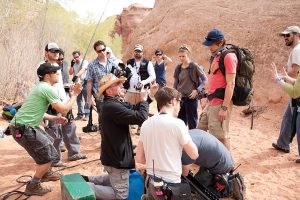 We record as much as we can. When we did Everest, we put some mics up on Everest, wrapped in lead because of the moisture, for 6 weeks. We got the atmosphere at night, the sound of the mountain moving. We’ve got a job coming up where the sea is a very big part, it’s a remake of Rebecca, so we’re going to go and record, to try and get the sea to talk to you and change the emotion.
We record as much as we can. When we did Everest, we put some mics up on Everest, wrapped in lead because of the moisture, for 6 weeks. We got the atmosphere at night, the sound of the mountain moving. We’ve got a job coming up where the sea is a very big part, it’s a remake of Rebecca, so we’re going to go and record, to try and get the sea to talk to you and change the emotion.
For 127 Hours we went to Utah, down in the canyon, and recorded for three days. We recorded the sound of the sides of the rock. So in the scene where he cuts his arm off [SPOILER ALERT!] we recorded in exactly the same place where it happened. I actually built a canyon in the studio, with the rock – the sandstone walls and limestone at the bottom – and recorded everything he held within that space.
That may sound stupid but my thinking is that the sum of all those parts will hopefully add up to something special.
Resurface thanks Glenn Freemantle for giving so freely of his time and The Media Production Show for allowing us to share our keynote interview.
Yesterday is in cinemas from Tonight, 28th June 2019.
Pictures courtesy of IMDb
The Media Production & Technology Show 2020 takes place on the 13th and 14th May 2020 at London Olympia.
